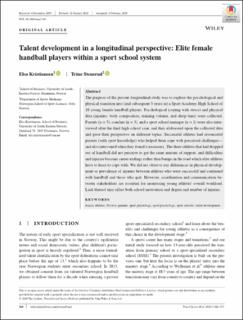Talent development in a longitudinal perspective: Elite female handball players within a sport school system
Peer reviewed, Journal article
Published version
Permanent lenke
https://hdl.handle.net/11250/2675343Utgivelsesdato
2020Metadata
Vis full innførselSamlinger
Originalversjon
Kristiansen, E. & Stensrud, T. (2020). Talent development in a longitudinal perspective: Elite female handball players within a sport school system. Translational Sports Medicine (TSM). 2020, 3(4), 364-373. https://doi.org/10.1002/tsm2.143Sammendrag
The purpose of the present longitudinal study was to explore the psychological and physical transition into (and subsequent 3 years in) a Sport Academy High School of 10 young female handball players. Psychological (coping with stress) and physical data (injuries, body composition, training volume, and sleep time) were collected. Parents (n = 5), coaches (n = 3), and a sport school manager (n = 1) were also interviewed after the final high school year, and they elaborated upon the collected data and gave their perspective on different topics. Successful athletes had resourceful parents (with sport knowledge) who helped them cope with perceived challenges—and also intervened when they found it necessary. The three athletes that had dropped out of handball did not perceive to get the same amount of support, and difficulties and injuries become career endings rather than bumps in the road which elite athletes have to learn to cope with. We did not observe any differences in physical development or prevalence of injuries between athletes who were successful and continued with handball and those who quit. However, coordination and communication between stakeholders are essential for monitoring young athletes' overall workload. Lack thereof may affect both school motivation and degree and number of injuries.

